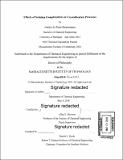Effects of solution complexation on crystallization processes
Author(s)
Pons-Siepermann, Carlos A.(Carlos Alberto)
Download1103315531-MIT.pdf (19.84Mb)
Other Contributors
Massachusetts Institute of Technology. Department of Chemical Engineering.
Advisor
Allan S. Myerson.
Terms of use
Metadata
Show full item recordAbstract
Crystallization is a separation technique widely used in chemical processes to produce high-purity solid products. The impact of solution chemistry on the kinetics and thermodynamics of crystallization processes is neither well understood nor properly characterized. Therefore, there exists a need for research to develop chemistry that can exploit the effect of impurities, additives and foreign molecules on the chemistry within crystallizing solutions. The use of rational chemical interactions has the potential of enhancing the controllability of crystallization unit operations, providing a new process handle for chemical engineers with which they can create new crystal forms, enhance product purity, improve yields, or inhibit the formation of undesirable crystals. This thesis focuses on the use of small-molecule chemical additives that exhibit selective intermolecular interactions with crystallizing solutes or their impurities. Within the work reported, there were two major areas of study: purification and nucleation control. Additive-driven solution complexation with impurities was demonstrated to be a powerful tool for enhancing the purity of crystal product, without penalizing the process yield. The technique was implemented for the separation of structural isomers, and tested for the purification of a large pharmaceutical compound with challenging chemical features. The results herein helped elucidate the capabilities of complex-assisted crystallization, and also outline the thermodynamic and chemical limitations of the technique. The second half of the work explored the impact on nucleation rates of dilute impurities that interact with the supersaturated crystallizing solute. For the first time, impurity-driven nucleation inhibition was systematically and quantitatively proven, using high-throughput induction measurements. The experimental results were used to discern the thermodynamic and kinetic impact of the inhibitor, and to elucidate a potential underlying mechanism for the observed behavior. Data demonstrated that even a weakly-interacting dilute additive can lead to massive nucleation rate depression through a kinetic pathway, most-likely due to the disruption of the ordering of the solute molecules within high-concentration clusters during nucleation.
Description
Thesis: Ph. D., Massachusetts Institute of Technology, Department of Chemical Engineering, 2018 Cataloged from PDF version of thesis. Includes bibliographical references (pages 113-119).
Date issued
2018Department
Massachusetts Institute of Technology. Department of Chemical EngineeringPublisher
Massachusetts Institute of Technology
Keywords
Chemical Engineering.